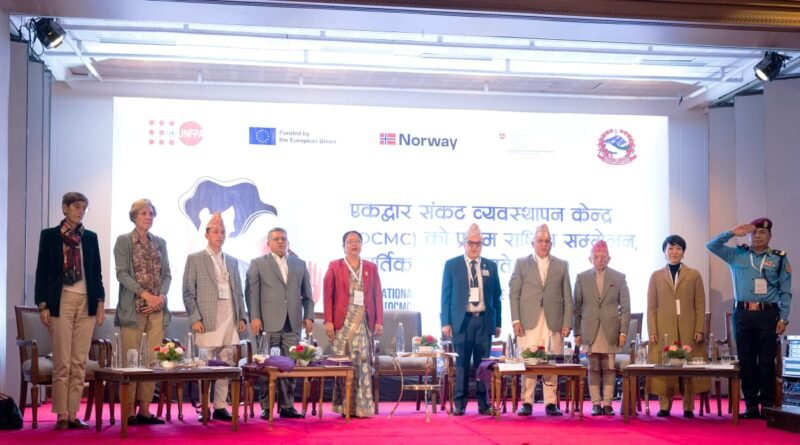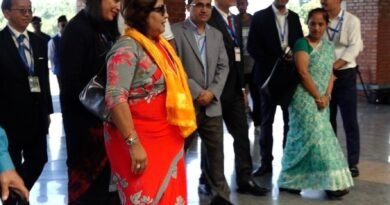The Government of Nepal Hosts First National Conference on One Stop Crisis Management Center
Kathmandu-The Ministry of Health and Population and the Ministry of Women, Children, and Senior Citizens, in collaboration with UNFPA in Nepal, hosted the first-ever National Conference on One Stop Crisis Management Centers (OCMCs) in Kathmandu. The conference, inaugurated on 14 November 2024 by the Honorable Minister of Health and Population, Mr. Pradip Poudel, brought together over 400 frontline Gender-Based Violence (GBV) service providers from 92 OCMCs across Nepal.
The event also included senior government officials, civil society representatives, and international development partners, aiming to enhance the effectiveness of OCMCs in delivering rights-based, gender-sensitive, and multi-sectoral services to GBV survivors.
The conference focused on critical themes, including:
Strengthening multi-sectoral coordination among stakeholders for effective case management of GBV.
Identifying opportunities and charting the way forward in GBV prevention and response.
Ensuring sustainable financing and local ownership of OCMCs for integrated GBV prevention and response.
The event also showcased international best practices, highlighting the importance of adapting global models to Nepal’s unique context.
In his inaugural address, Minister Mr. Pradip Poudel emphasized the critical role of addressing GBV to advance human rights and gender equality. He reaffirmed the Ministry’s commitment to improving health services, accessibility, human resources, and infrastructure to ensure affordable, survivor-centered care. “We are dedicated to enhancing the services of One Stop Crisis Management Centers, ensuring they provide accessible, affordable, and survivor-centered care,” he stated.
The conference featured remarks from prominent leaders and diplomats, including H.E. Ms. Veronique Lorenzo, Ambassador of the European Union to Nepal Dr. Danielle Meuwly, Ambassador of Switzerland to Nepal, Won Young Hong, Resident Representative, UNFPA Nepal, Kamala Parajuli, Chairperson, National Women Commission (NWC), Tap Bahadur Magar, Chairperson, National Human Rights Commission, and Dr. Shiva Raj Adhikari, Vice Chairperson, National Planning Commission,
Ambassador Lorenzo underscored the European Union’s commitment to extending collaboration with all stakeholders for rendering more effective OCMC services to GBV response and prevention. “We look forward to seeing the OCMCs as important entry points not only combating GBVs but also empowering women and fostering gender equality,” she said.
Dr. Meuwly emphasized the importance of OCMCs, stating, “Strengthening systems like the One Stop Crisis Management Centers is vital to ensuring survivors of gender-based violence receive the care and support they need. Switzerland remains committed to making services more accessible, reliable, and survivor-centered.”
UNFPA Representative Won Young Hong highlighted the significance of collective action: “Over a decade of OCMC operations has shown the power of collaboration in supporting GBV survivors. Yet, with one in four women facing violence and 72% not seeking help, we must break barriers, build trust, and strengthen accountability. Together with the Ministry of Health and Population, Ministry of Women, Children, and Senior Citizens, and our esteemed partners—including the European Union, Norway, and the Embassy of Switzerland—we can create a future where every survivor has access to holistic, survivor-centered care and the opportunity to heal and thrive.”
The two-day conference concluded with the National Commitment and Action Plan. Delegates committed to concrete actions to enhance OCMC services, making them more efficient, accessible, affordable, and survivor-centered. Key outcomes included:
Increasing resources to improve infrastructure and quality of services institutional frameworks, and infrastructure to improve the reliability of OCMC services.
- Committing to multi-sectoral coordination for effective GBV response through the OCMC.
- Conducting awareness campaigns to inform survivors and at-risk individuals about available services.
Producing and disseminating social and behavioral change materials.
Utilizing modern technologies, including telemedicine, to expand the reach and accessibility of OCMC services.
Investing in the training and capacity building of OCMC staff.
In his closing remarks, Hari Prashad Mainali, Secretary, Ministry of Health and Population, expressed gratitude to development partners and stakeholders for their ongoing support. He acknowledged the dedication of OCMC staff in providing critical services despite resource constraints and emphasized the need for actionable outcomes from the conference. “This conference has laid the groundwork for a robust action plan that will serve as a key roadmap for strengthening OCMCs and ensuring survivor-centered care for GBV survivors,” he concluded.




